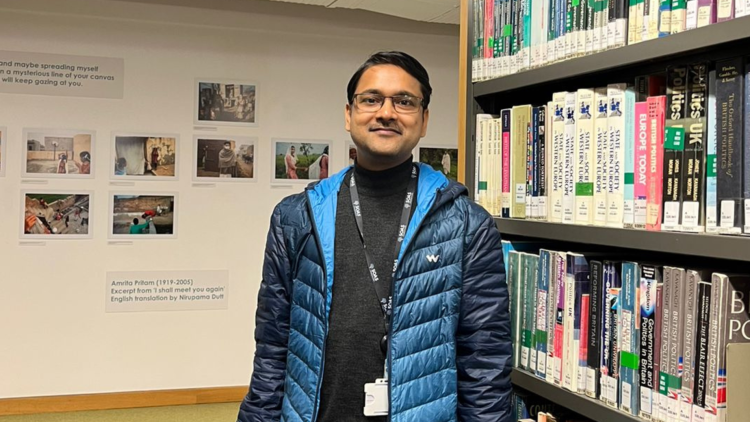BSc Accounting and Finance


Key information
- Duration
- 3 or 4 years
- Start of programme
- September
- Attendance mode
- Full-time
- Location
- On Campus
- Fees
-
Home: £9,535
International: £23,780 - Course code
- N400
- Entry requirements
-
ABB
Contextual: BBB
Subject required: Applicants without A level Maths (or equivalent) must have a minimum of grade B in GCSE Maths (or grade 6 in the new structure)
-
See undergraduate entry requirements and English language requirements for international and alternative entry requirements.
Course overview
This BSc Accounting and Finance programme is ideal for students whose ambition is to pursue a career in accounting, finance, investments, auditing, taxation, and other finance-related strategic roles in business.
You will learn how to analyse financial statements, how to critically evaluate investment opportunities, how to design financial plans, and how to make strategic decisions in the areas of accounting, banking, finance and investments. Our teaching offers you exceptional insights into financial institutions and markets in London and other major cities in the world.
In addition, we offer specialist knowledge of financial and management systems in the emerging markets of Africa, Asia and the Middle East – something that will set you apart from graduates of other universities that normally focus on the analysis of Europe and the Americas.
The School of Finance and Management is excited to continue its collaboration with Practera, building on the success of the previous SFM Virtual Industry Projects. These bespoke work-based learning projects are designed to grow your professional skills and network through working with a team of SOAS students to tackle a real-world business challenge.
Why study BSc Accounting and Finance at SOAS?
- We are ranked 42nd in the UK for Accounting and Finance (Complete University Guide 2025)
Year in Industry
This programme offers a professional placement opportunity designed to improve your employability and put you in a better place for life after university. A professional placement is a great first step to getting necessary work experience and securing the career you want.
During your third year, you will work with a business or organisation and apply the knowledge you've learnt on your course in the workplace. You’ll develop skills like planning, problem-solving, decision making and project management, while getting first-hand experience on how a professional organisation works.
*Placement opportunities are organised by the student. If a placement is not found, you will be transferred onto the standard 3-year programme of study.
Study Abroad
Students are able to apply for the optional year abroad in their second year of studies at SOAS. Students will be invited to information sessions about how to apply during their second year of studies by the Study Abroad team. Student applications are considered on academic merit and a personal statement and are subject to availability. Students need to have achieved 55% or higher in their first year of studies to be eligible. For further details, visit the Study Abroad section of our website.
Accreditation
Finance and Business Network Seminar
- This Seminar Series is open to all our UG and PG students. It offers you the opportunity to engage with experts from the worlds of business, finance, banking, and the public sector.
- Listen to leaders within their fields and network with them, fellow students and Faculty over refreshments.
- Most events will be held on campus, but some will be held at industry headquarters such as in 2022/23 when an event was held at Citigroup’s Canary Wharf Offices.
- The networking part of the seminars will also provide opportunities to engage with practitioners to help foster students’ career visions.
Structure
Students take 120 credits each year composed of Core, Compulsory and Optional modules.
- Core modules: These are mandatory and must be passed in the year they are taken before the student can progress to the next year.
- Compulsory modules: These are mandatory but in the case of a failure, students may carry this into their next year provided that they retake and pass the failed element or exam.
- Optional modules: These are designed to help students design their own intellectual journey while maintaining a strong grasp of the fundamentals.
Important notice
The information on the website reflects the intended programme structure against the given academic session. The modules are indicative options of the content students can expect and are/have been previously taught as part of these programmes.
However, this information is published a long time in advance of enrolment and module content and availability is subject to change.
Year 1 - Core
Year 1 - Compulsory
Year 2 - Core
Year 2 - Guided options
Up to 30 credits from List A or Language open options
Year 3 - Core
Year 3 - Compulsory
Year 3 - Guided options
15 credits from List B or Language open options
Teaching and learning
In the School of Finance and Management, the modules draw from real life business experience and cutting-edge research.
Contact hours
Most undergraduate modules have a one or two-hour lecture and a one-hour seminar every week. Lectures and seminars are often taken by different professors in order to provide a variety of angles on the subject. The majority of the student’s time will be through their own independent study. Students become more active in class through their reading and essay-writing and should greatly enhance their participation in discussion groups.
Independent Study Project (ISP)
The ISP is usually taken by final-year students only. Its aim is to provide an opportunity for students to conduct original historical research on their own initiative, to engage in in-depth analysis of particular subjects and to use a range of primary historical sources.
It is assessed by a single 10,000-word dissertation (including notes but excluding bibliography).
Learning resources
SOAS Library is one of the world's most important academic libraries for the study of Africa, Asia and the Middle East, attracting scholars from all over the world. The Library houses over 1.2 million volumes, together with significant archival holdings, special collections and a growing network of electronic resources.
Fees and funding
Fees for 2026/27 entrants per academic year
| Programme | Full-time | |
|---|---|---|
| UK students | Overseas students | |
| BA, BSc, LLB | £9,535 | £23,780 |
| BA/BSc Language year abroad | £1,425 | £11,770 |
See undergraduate fees for further details.
Employment
Graduates from the School of Finance and Management leave SOAS with a coherent and solid knowledge of management and finance, with skills in statistics and computing, critical reasoning and analytical thinking.
Recent graduates have been hired by:
- Christian Aid
- Dagong Global
- Deloitte
- Department for Business, Energy and Industrial Strategy
- Elbus Group
- Financial Times
- FM Capital Partners
- HM Treasury
- Houlihan Lokey
- Huaxia Bank, China
- IDB (Islamic Development Bank)
- Investec
- J.P. Morgan Asset Management
- KPMG
- Lloyds Banking Group
- Santander
- UBS
- University of Oxford
- White & Case LLP
- World Food Programme
Find out about the Careers Service.










